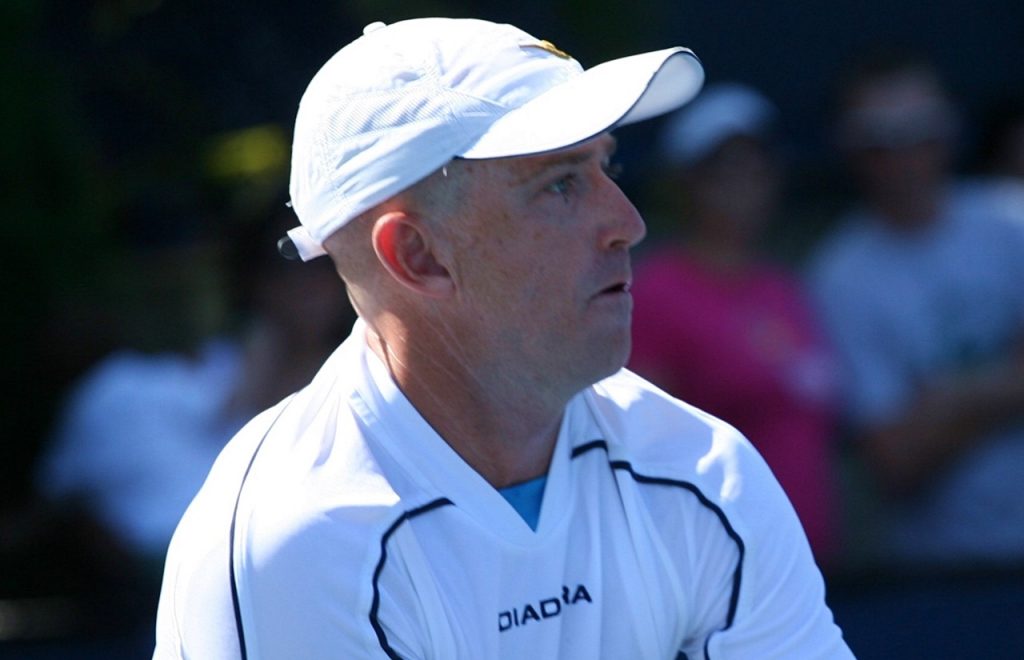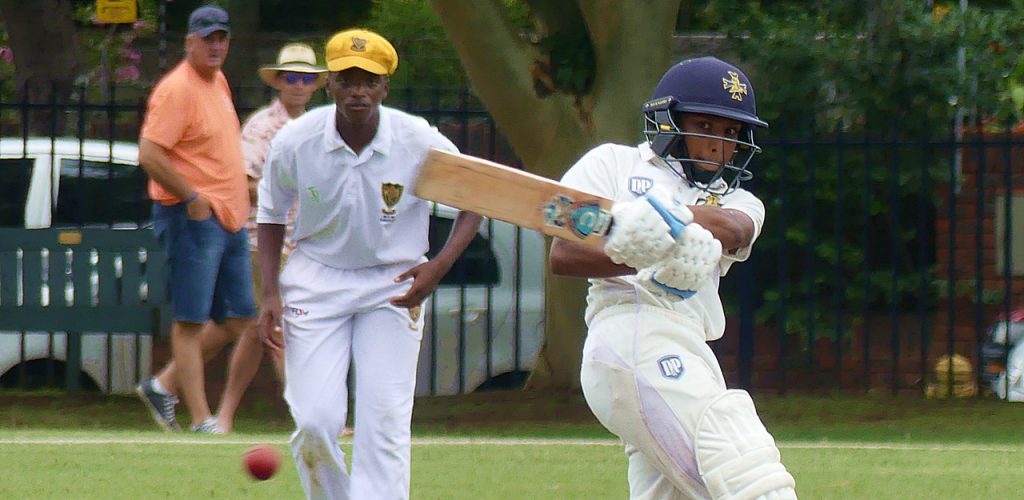Posts Tagged ‘northwood’
Grand Slam champion Kevin Ullyett talks tennis and influences
4 June 2020 – Born in Zimbabwe, Kevin Ullyett moved to South Africa at a young age. He attended Atholton Primary School in Umhlanga Rocks before moving on to Beachwood (which less than a year after he finished there amalgamated with Northlands and became Northwood) for high school. At the beginning of his matric year, he left school to pursue a career as a professional tennis player. It proved to be an excellent decision. He spent 18 years on tour, winning 34 doubles titles in total, including three Grand Slams.
Speaking with KZN10.com’s Brad Morgan, he said sport was an important part of life in the Ullyett household. Kevin’s dad, Robert, played Currie Cup cricket for Rhodesia and also represented the country in hockey at the 1964 Olympics in Tokyo. His older brother, Clive, was also a good tennis player who would go on to play professionally, but without achieving similar success to Kevin.
From an early age, the boys were subjected to an active lifestyle and from the latter days of his junior school career that meant early morning tennis coaching for Kevin, between 05:30 and 06:30, under the tutelage of Peter Waters. Then it was off to catch a bus to school at 07:00.
Kearnsey, Northwood share spoils in cracking season-opener
https://kzn10.com/kearsney-northwood-share-spoils-in-cracking-season-opener/

Peter Waters coached Kevin from a young age. He eventually retired in mid-2019 after a coaching career that lasted 55 years.
“As I started putting in the hours,” he recalled, “I started having some decent results and realised I liked it more than the other sports, I suppose.”
Becoming a top junior player meant his holidays were often filled with tournaments. “Every holiday, from under-12, about standard five, I would go to Johannesburg, because it’s always been the place where the tournaments were held. Then, at the end of the year, there were the East London and Port Elizabeth Sugar Circuit events. From under-12 through to under-18, I did that every year.”
Tennis at Beachwood was strong. Practices took place a couple of times a week and then there were matches, too. Westville Boys’ High, at that time, was also exceptionally strong and Kevin often played against those players, who included, among others, Robbie Koenig, Ellis Ferreira, Grant Adams, Kirk Haygarth and Myles Wakefield, all of whom went on to successful professional careers.

Get a firmer grip on your possessions with KZN’s Titan Technologies. https://www.titantech.co.za/
Robbie Koenig, who has become a world-renowned tennis commentator, was a good friend and rival as they grew up. “Robbie and I played so much junior tennis together. We had such good battles throughout our junior career, and we would go and practice together on weekends, all day. He was quite instrumental in my game, because he was probably the best competitor out of all the juniors here, like a Pit bull, never-give-up kind of attitude. He broke my heart so often in the juniors. It toughened me up a lot. We spent so much time together. It was good.”
While Robbie might have broken Kevin’s heart at times, Robbie wasn’t having any of it when discussing Kevin. “Don’t take his BS,” he said with a laugh. “When it really mattered he got one over me in the seniors, when there was big money up for grabs. Over the course of his career, he cost me a boatload of money on the Pro Tour.”
Remembering his time at Beachwood, Kevin said: “We had a really good Headmaster, Mike Ellis, when I was there. Back in those days, there was a lot of structure and quite a lot of discipline. Nowadays, I think the kids get away with murder, but back then there was no stepping out of line. Mike Ellis went on to become a politician for the DA and Mr Robinson, the Vice-Head, stepped in. That structure and discipline helped me in tennis. My dad also got us to focus on a hard work ethic.”
The teachers, too, were really good, he said, and the competition provided by other nearby schools, like Glenwood and Northlands, helped keep the standards high.

At the Inter-provincial Schools Tennis Tournament in Bloemfontein, with Damian Mustard (Pinetown), Garth Furmidge (Michaelhouse), Ryan Fitzwilliam (Northlands), Roger Mills (Westville), Kevin Ullyett (Beachwood), Clint Lishman (Grosvenor), teacher Gary Coombe (Beachwood) and Kirk Haygarth (Westville).
When Kevin reached matric one of the pivotal moments of his life occurred three weeks into the first term. He explained: “During that time, tennis in South Africa was at a stage where there were a lot of local events, challengers and satellites, where locals were getting wildcards, guys like Wayne Ferreira and Marcos Ondruska.
“There were eight to 10 guys who were getting world rankings points and doing really well in those tournaments. They were all leaving school, so I convinced my dad (I don’t know how) that I should leave school as well.
“I completed my schooling through correspondence and split it over two years, so that I could play tennis and travel to all of the events around the country, while I was still under-18. I played against all the Defence Force guys who were doing their national service. That’s what I convinced my dad about and he bought into it.”

Pivotal Talent’s Online SubjectChoice (Grade 9s) and CareerGuide (Grade 10s, 11s and 12s) solutions replaces uncertainty with accuracy in directing your children to make full use of their potential. Check out www.careerguidesolution.co.za
Nowadays, without the tournaments that existed back then, it is so much harder for South Africans to make it onto the ATP World Tour, but at that time the satellite and challenger events drew players from overseas. And the high altitude of Johannesburg favoured the local players, Kevin recalled.
“The conditions in Joburg were quite different and the ball flew around. They weren’t used to that. Living here, it was a great opportunity for the young guys, who were getting wildcard opportunities, to get some scalps of the guys who were coming over and ranked 200-300 in the world. That was a good springboard, but it is much harder now starting out, because you have to fly to other countries and play in tough conditions to fight for points.

Hanging out with visiting players for a Challenger event in Durban. That’s Ryan Fitzwilliam (Northlands) on the right, opposite Kevin, in front.
“If you did well in those tournaments back then, you could pick up 10 or 30 points in a Challenger and ramp up your ranking. It was easier, but now you have to get out there, find some places you can get in. There are also more people playing, and it takes cash to travel now. We were lucky back then that the South African Tennis Federation assisted a lot of the juniors to get into tournaments.”
The fact that a group of talented juniors, many of them from KwaZulu-Natal, were emerging at the same time helped them make the jump into the professional ranks. “That’s key,” Kevin said. “That’s why I think the Spanish and the French have done so well. They’ve had 15 to 20 guys all at once [coming through].

“You don’t to want to lose to the one guy and he makes some points, and you want to match him. It’s a good rivalry to have and we had that, with about six to eight guys in Natal, and then there were the Joburg guys, so there was a good pool of kids. We had the numbers, but I feel they have now dwindled a little and it’s difficult to get that now.”
Support from the national tennis federation also played a crucial role, with a Super Squad, under the coaching of Glenwood old boy Keith Diepraam, featuring Wayne Ferreira, Marcos Ondruska and Grant Stafford, while just below them was the Elite Squad, which included Kevin. It was coached by Kobus Botha.
“Those couple of years, 1991-1994, with Kobus really helped me, especially mentally,” Kevin said. “He was really good on the mental side of competing and we worked terribly hard, and that’s what gave me a good springboard. Peter Waters gave me my whole life as a kid but, when I left Durban and went to Joburg and overseas, Kobus was the one that pushed me to get onto the circuit and to play bigger events.

Coach Kobus Botha (left) played a very important role as Kevin transitioned to life as a professional tennis player.
“In 1995, Kevin Curren coached and mentored me, which was also a key stage in my career. He taught me how to think more of the ‘bigger picture’ and play the right way and not be results/cash-driven, which took some pressure off of me. He encouraged and helped me to put on five kilograms with the help of a trainer in Austin, Texas, to try add more pace on shots and move more explosively. I was very fortunate to have someone like Kevin Curren, who had competed at the highest of levels of the game, guiding me.”
Kevin enjoyed some success as a singles player, with his ranking settling in between 100 and 300 in the world from the time he was 19 years of age. But there was a problem: clay courts. “I was more of a classical player, playing on fast courts. I had to bypass the whole clay season because I couldn’t actually move on the stuff. My results were too inconsistent to keep my ranking at 100 or below on a regular basis. I had to rely on a couple of good weeks every year, and it showed in my singles rankings.”
Some of the older pros, who were playing doubles, suggested to him that he should focus on doubles. He made the decision to follow that path in 2000, strangely enough after his best year in singles in 1999.
“It takes a lot of hard work to stay high up in singles. It was a career decision to hang up my racquet and do something else or to give doubles a crack, like all the other guys were doing, and see what happens. It turned out that I had eight really good years of doubles.
With the benefit of hindsight, he admitted: “I should have done that earlier. I felt I still had something to offer in singles, but the [good] results were too intermittent.”

Young and with a full head of hair, practicing to make it to the top.
Doubles also had the benefit of having a partner. “The singles is more cut-throat,” Kevin said. “In doubles, it’s nice to play as a team. You can practice together. It’s a lot more beneficial. If you just play singles, it can be quite solitary. The doubles’ players generally get on really well. There is a lot of camaraderie.”
Finding the right partner is important, though, especially with matches often being decided by small details and margins. He explained: “It’s like trying to find a girlfriend. What was important to me was finding someone to fit my style of play. I was decent at the net, but I wasn’t as consistent at returning, so I needed someone who could return really well. That’s what I looked for. If saw someone who was solid on returns, those were the people I would target.
“You just have to go up and ask. You just say why don’t we try a few weeks and the worst they can say is no. You try it and work, and then you commit to play the next year, and then you’ve got to give the bad news to your current partner that you’re breaking up with them, and it happens in reverse. Your partner might tell you they’re moving on, which is fine. It’s a career decision. I think everyone understands that. You’ve got to look after number one, unfortunately.”
His doubles exploits started with Pietie Norval, who had partnered Wayne Ferreira to an Olympic silver medal in Barcelona in 1992. “We were mates and we spent a lot of time together in London, and we did well for a couple of years. It was just people I knew,” Kevin said.

Check out the Cell C personal and business contracts at https://www.cellc.co.za/cellc/contracts
Despite leaving Zimbabwe at an early age, the country came to play a role in Kevin’s tennis career and the Black family, which produced professional players Byron, Wayne and Cara, were a big part of it.
Looking back, Kevin said: “We left Zimbabwe pretty early. I remember Wayne, we were a similar age, playing juniors at under-eights. Then I didn’t see him for my whole junior career, but bumped into him again as we were all turning pro.
He and Wayne then formed a very successful doubles partnership, including teaming up to play Davis Cup for Zimbabwe. Their tie against the USA in Harare in 2000 is a match that Kevin reckons was the most memorable of his career.
“It was at the Sports Centre, which had a corrugated iron roof, and we had 5 000 people banging drums in between every point. It sounded like a festival. The Americans included Andre Agassi and John McEnroe was the captain. It was phenomenal. We had a packed Harare crowd and we managed to win 7-5 in the fifth set [against Rick Leach and Alex O’Brien]. That was probably the greatest moment and most intense match I was a part of.” The victory gave Zimbabwe a shock 2-1 lead over the USA, but they were unable to hold on to it and eventually went down 2-3 after a tremendous battle.
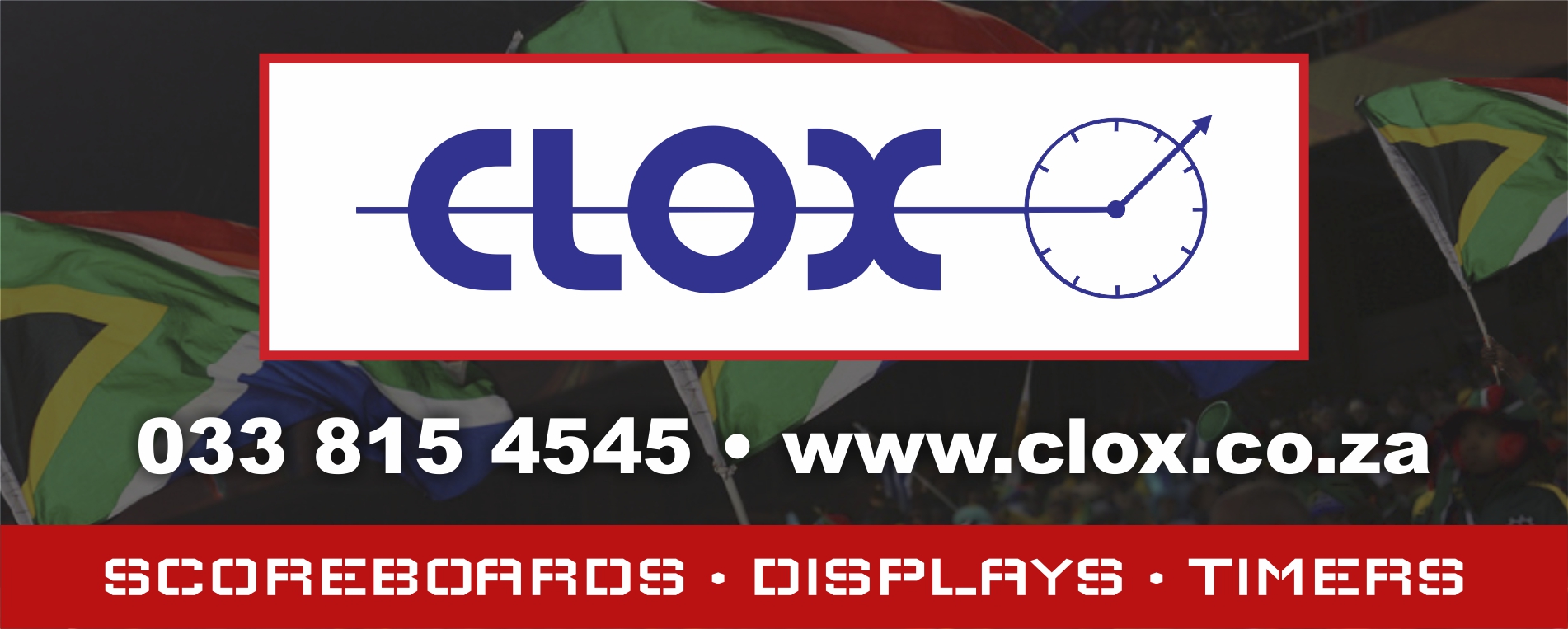
When the match is tight and every run counts, you can count of Clox Scoreboards of KZN. http://clox.co.za/
Playing in the Davis Cup brought a different dynamic to competition and it was something that Kevin enjoyed. “It was amazing. Our Davis Cup matches in Zim were always a nice week back there. We practiced hard and the crowds were really vocal and it was fun. We would have a really good time. We didn’t really put that much pressure on ourselves. It was really something to play in a team event for your country.”
In 2001, Kevin and Wayne Black claimed a major title, the first for both of them, when they landed the US Open crown with a 7-6 (11-9), 2-6, 6-3 victory over the American duo of Donald Johnson and Jared Palmer in the title-decider.

New York: Kevin Ullyett and Wayne Black celebrate victory in the 2001 US Open. It happened just two days before the terrorist attacks on the World Trade Centre’s Twin Towers.
Remembering what it took to get there, Kevin said: “We would often get to the quarters or semis, one or two matches away, and it builds up a lot of pressure. In losing a few heart-breakers, you learn some hard lessons and you feel terrible afterwards. But two, three, four years down the line, you get in a similar situation again and the experience from those hard knocks before is valuable.
“You also see mental coaches and follow those kinds of processes to try and put yourself in that situation again and see what and how you would do things differently. That all goes into a mixing pot to improve yourself. Once you got yourself into a similar position again, you were ready.”

It is imperative for coaches to know what works for you. Get in the driving seat with the tried and tested. Contact Trish right now at info@trishsutton.co.za
The following year, in 2002, Kevin captured another Grand Slam title, teaming up with Daniela Hantuchova of Slovakia to takes the honours at the Australian Open. That was an unexpected result.
He recalled: “It was by chance that I played with Daniela. Her coach was a good friend of mine, Nigel Sears, and we were in Cape Town. We used to go there every year before the Australian Open, and she would fly from Europe to practice with him there. I was looking for hits and would hit with her. We put in some practice sessions and just said let’s play some mixed doubles. Our first tournament we played in we won and it was the Australian Open, so it was perfect!”

Kevin and Daniela Hantuchova lift the trophy after claiming the Australian Open mixed doubles title with a convincing 6-3, 6-2 win over the Argentinian pair of Paola Suarez and Gastón Etlis in the final.
His third and final Grand Slam win came in 2005 at the Australian Open when he and Wayne Black beat the most successful doubles team in history, the twins, Bob and Mike Bryan, 6-4, 6-4.
“I always had a dream of winning a Grand Slam. But, if I am honest with myself, I never really thought I would,” Kevin said. “It didn’t feel like we were good enough at one stage, but things started to happen. The next thing we had a Grand Slam title to our name and from there the confidence got really big. Once you’ve achieved that kind of milestone you want to win more. It was a surprise in a way.”
Apart from the three Grand Slam wins, he also made the Wimbledon final in 2008, partnering Jonas Björkman, along with six further semi-finals and 12 appearances in the quarters of the Grand Slams.

Take a 5-star break from life in the fast lane. Contact Fordoun CEO and former Michaelhouse rugby star Richard Bates for your well-earned break. https://www.fordoun.com/
In mixed doubles, he made the Wimbledon final with Daniela Hantuchova in 2002 and made it to the semis with her in 2003. Two years later, he teamed up with former South African, Liezel Huber (now an American citizen), to reach the Wimbledon semis once again. That same year, he and Huber were beaten in the Australian Open final.
On the top rung of the ATP World Tour, Masters 1000 events, he recorded wins in Miami and Hamburg in 2004, in the Canada Open in Montreal in 2005, Hamburg again in 2006, and Paris in 2008. The first three titles were with Wayne Black, who retired after the 2005 season, while the latter two were with Paul Hanley (Aus) and Jonas Björkman (Swe). There were eight further finals appearances, 13 semi-final slots, and 14 appearances in the quarter-finals.

Kevin Ullyett and his long-time doubles’ partner Wayne Black won the Masters 1000 title in Miami in 2004.
During the course of his career, he amassed over 500 victories and was ranked as high as fourth in the world in doubles.
As a fan of the game, he selected two matches as the best he has ever witnessed and both of them were singles finals at Wimbledon: the 1980 final between Bjorn Borg and John McEnroe, which Borg edged 1-6, 7-5, 6-3, 6-7 (16-18) and 8-6, and the 2008 final, an incredible shot-making classic, between Roger Federer and Rafael Nafal which the Spaniard won 6-4, 6-4, 6-7 (5-7), 6-7 (8-10) and 9-7.
In 2004, Kevin married Marylou in Hillcrest. In 2005, their first child, Jemima, was born. As a top sportsman travelling the world, with a child in tow, life had become more complicated.
He explained: “After 9/11 airline travel became so much more difficult, especially travelling with a kid and prams. You would go the airport for a 14:00 flight out of New York and you would get there at 11:00 to deal with the stringent security. It was becoming so tedious, so you really had to work hard on your schedule, and you needed a good travel agent to make sure that you were not flying via this place, via that place, and another.”
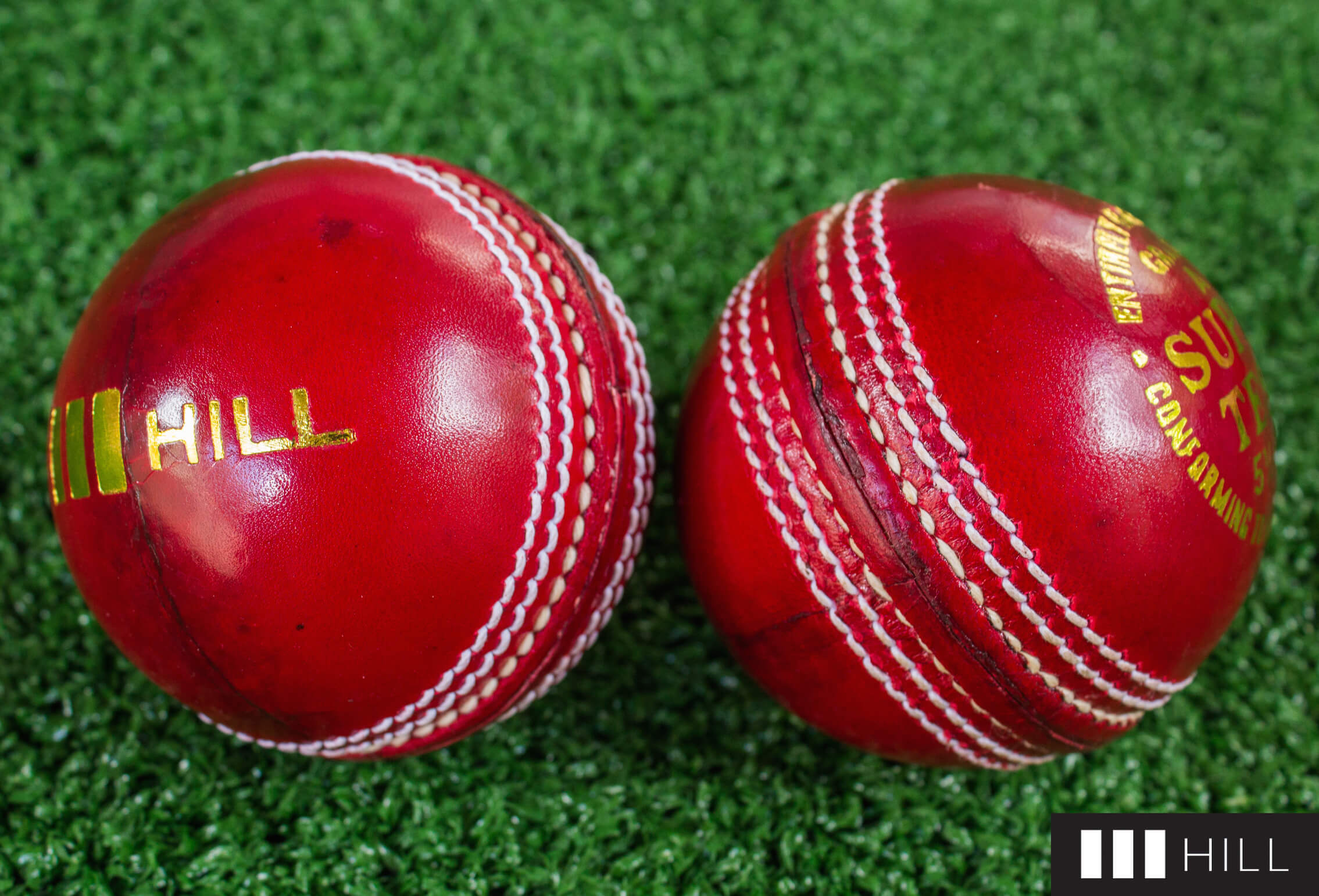
Hill Premium Quality Cricket Balls stay the distance. www.hillcricketballs.co.za
Inevitably, Kevin began considering the next step in his life, the one after tennis. Finally, after he made the decision to retire, he ended his career at the 2010 South African Open, partnering Wesley Moodie in the doubles.
“At that stage I was 36 and the travel was getting tough. I was a little over-cooked by then. I had been on tour for 18 years. It was quite a difficult decision, but in hindsight sometimes you get a bit clouded by the travel and losing some matches. That life is actually phenomenal.
“You get into the ‘real world’ and you realise how good playing tennis and making a living is. You’ve got your own time, you’re outside, playing a sport you love, and you’re getting paid.

A sticky wicket makes for messy backyard cricket. Take action before it’s too late. www.midlandssepticservices.co.za
“Just the kids and the travelling and, maybe, being away from them led me to think about doing something else. By default I fell into property development through my brother-in-law and a friend back in South Africa, just as I was trying to figure out what I was going to do for the next 20 to 30 years of my life.”
For a while, he and his young family lived in London following his retirement, and soon another son, Nicholas, was born. They then made a decision to return to South Africa and a home on the north coast. Back in South Africa, Florence, his fourth child, became the only one of his children to be born in South Africa.
Now, with four children – Jemima, Sebastian, Nicholas and Florence – it’s a very different life, revolving around family and plenty of time spent at home. There is time, too, for golf and he’s excelled there, winning the SuperSport Shootout in 2015 and multiple Umhlali Club strokeplay titles.
Travel is no longer an unavoidable part of his life. And Kevin’s very happily enjoying the change.

When it comes to planning your next school sports tour look no further than former Hilton College first XI captain Craig Goodenough who’s been there, seen the movie and bought the T-shirt factory.
Kearsney, Northwood share spoils in cracking season-opener
Coaches don’t expect perfection in a season opener, but there are other things they hope to see, like character and fight, and by that measure both Northwood coach Grant Bashford and Kearsney coach Nico Breedt will be satisfied with the effort of their charges in a pulsating 24-24 draw on Stott Field at Kearsney on Saturday, writes KZN10.com’s Brad Morgan.
Fortunes and momentum ebbed and flowed in the contest and, ultimately, there was nothing to separate the two sides on the scoreboard, not even at half-time when they turned level at 12-12. Both teams notched two tries and a single conversion in each half.

When the match is tight and every run counts, you can count of Clox Scoreboards of KZN. http://clox.co.za/
Northwood, after a memorable 20-12 victory over Kearsney at home last year, their first win over their Botha’s Hill opponents since 1996, wanted a good follow-up to that performance, but just three members of the side that claimed a sweet win in 2019 are left in this year’s line-up. That didn’t hinder them at all in the early going, though, as they took charge from the first scrum when they turned up the torque and powered over the Kearsney pack to earn a penalty, much to the delight of the travelling supporters.
The Knights were dominating up front and scrumhalf Prolight Shoba was doing a wonderful job in providing a quality, quick service from the rucks, which helped Northwood build up impressive momentum. They were soon rewarded with the opening try when Onyekachi John-Osunkwo powered his way over in the right corner. Luke Dudley put in a desperate smothering tackle, but momentum carried the Northwood centre across the try-line.

Northwood centre Onyekachi John-Osunkwo scored a first half brace. (All photos: Brad Morgan, KZN10.com)
The visitors then more than doubled their lead with a well-worked try, which was, again, rounded off by centre John-Osunkwo. Deep inside the Kearsney half, he profited from running a good line off the shoulder of his flyhalf, Emmanuel Bhiya, to receive a short pass, which pierced the home side’s defensive line and put him in under the posts.
At 0-12 down, it looked as if it might become a long afternoon for Kearsney, but the home team then showed character and resolve to lift their game and put Northwood on the back foot.

Kearsney centre Connor de Bruyn attempts to fight off a tackle from Northwood flyhalf Emmanuel Bhiya.
Kearsney forced a shot at goal from a penalty, but it missed the mark. However, they didn’t have to wait much longer to get on the scoreboard through their centre Dudley, which drew a massive roar from the home side’s supporters.
Four minutes from the break and suddenly Kearsney had drawn level. From a five-metre lineout, they mauled effectively towards the Northwood try-line, splintering the visitors’ defences, before loosehead prop Cameron van Eck crashed over for the five-pointer.
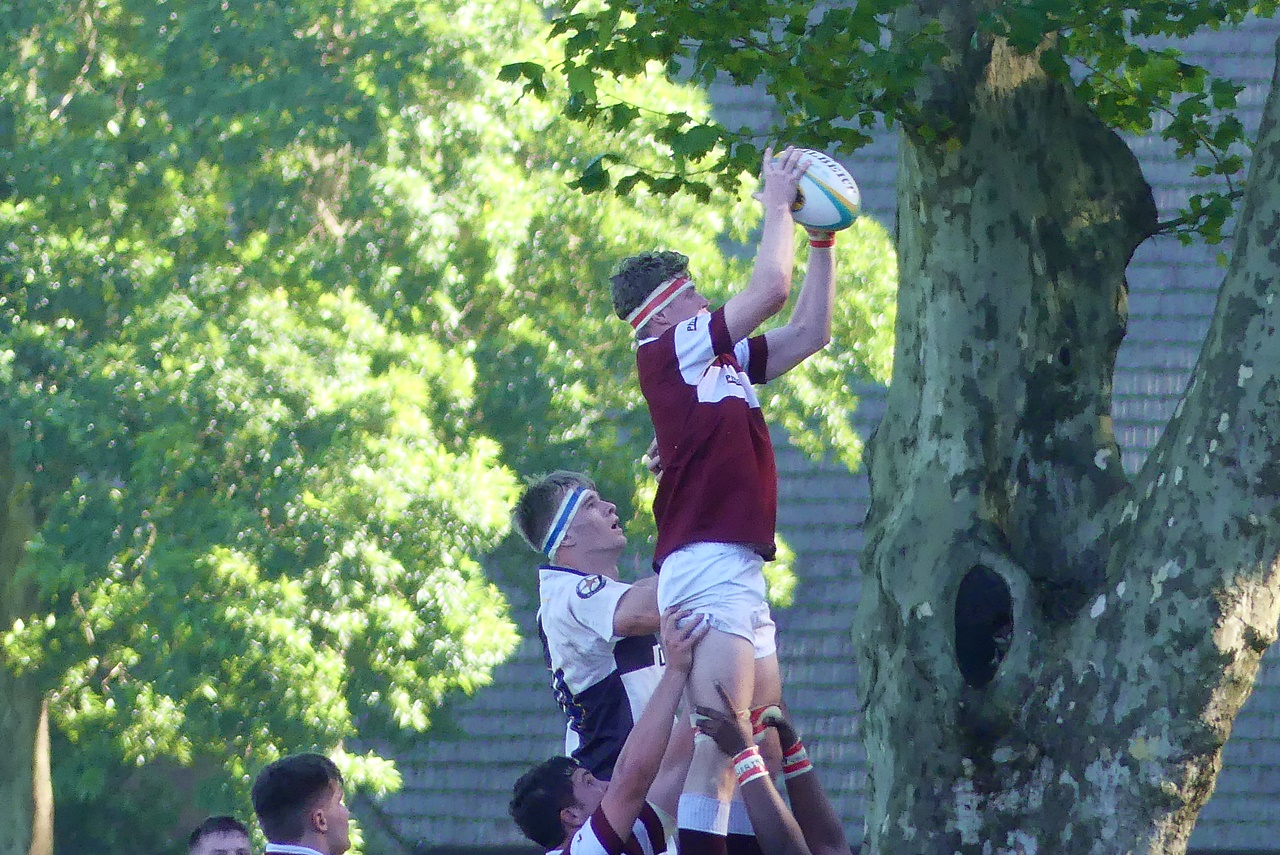
Kearsney forced their way over with a drive from a five-metre lineout to level the scores.
A gutsy, determined stand on their own try-line then stopped Northwood from edging in front once more, just before the half-time whistle.
After the break, Kearsney piled on the pressure and were almost over, but flyhalf Bhiya and towering lock Christopher Viviers combined to hold up the ball-carrier over the line.
The momentum was with the home team, but the pendulum swung when the Knights, who had been under sustained pressure, engineered a thrusting break down the left-wing from a turnover, with fullback Unathi Mayekiso diving over in the corner to put his side ahead once more at 17-12.

Get a firmer grip on your possessions with KZN’s Titan Technologies. https://www.titantech.co.za/
Kearsney, again, turned up the heat and their captain Massimo Fierro was brought down only centimetres shy of the line after a powerful thrust. Stopped there, they quickly shifted the ball from left to right to put fullback Trent Coetzee into plenty of space and he sprinted over for a third five-pointer for the men in maroon.

Centre Luke Dudley makes a break in the second half.
Kearsney’s fourth try, when it came, mixed simplicity with individual brilliance. From a set piece, flyhalf Matthew Hind, attacked the line before flipping a short ball to right wing Ayabonga Mngaza, who was flying up on his inside shoulder. Mngaza then did the rest, his mazy run cutting one way then the other, leaving the Northwood defenders grasping at air as he scythed his way through from 40 metres out to score a stunning try underneath the uprights. The simple conversion put Kearsney 24-17 up.

Winger Ayabonga Mngaza proved a handful for the Northwood defence with his pace and evasive running.
With time running out, Northwood surged onto the attack, but Kearsney’s defence was resolute: Northwood bashed the ball up and Kearsney repulsed them with some stiff tackling.
Then, with only three minutes remaining on the clock, fullback Mayekiso received a pass on the Kearsney 22. Pumping his big thighs hard, he brushed aside two tacklers, forcing his way through a half-gap before breaking clear to fly over and dot down under the uprights. A simple conversion levelled the game at 24-24.

Unathi Mayekiso burst through the Kearsney defence to score Northwood’s fourth try.
The home team tried manfully for the winning points, carrying the ball through a number of phases, but Northwood gave little away to keep Kearsney out of scoring range and when the final whistle sounded a draw was probably a fair result.
“If you’re unemotional about it, it was entertaining. It was back and forth and it could have gone either way,” commented 1st XV coach Grant Bashford afterwards.
“From the start we had, we’re disappointed to draw, but being down then coming back to draw, we showed a lot of character. All in all, there are some mixed feelings.”

Check out the Cell C personal and business contracts at https://www.cellc.co.za/cellc/contracts
Kearsney coach Nico Breedt, summed the up the clash as “a typical first game of the season. Both sides would have wanted fewer mistakes. I thought they were better than us in the set phases.
“From a Kearsney point of view, we would like to work on that. They put us under a lot of pressure during the set phases. We couldn’t exit our own half with the kicking game, which was quite poor.”
Referencing Northwood’s hot start, Breedt added: “We’ve got a good record at home and we weren’t panicking at 12-0 down, and I thought at one stage we were going to get some momentum after we made it 12-12. Unfortunately, instead of converting that pressure into more points, we let them back into the game.”

A strong showing from the Northwood forwards ensured quality ball for the Knights’ backline.
The performance of the Northwood pack at scrum time pleased Bashford: “They were under pressure, they couldn’t get off of the base of the scrum. [Eighthman] Massimo Fierro and [centre] Connor de Bruyn were their two big carriers, Fierro off the base and Connor running shorter. They never really got that going today and that was from the pressure that was exerted in the scrum. We did enough in our scrum to unsettle them at the base and deny them the momentum that they were looking for from Fierro and De Bruyn.”
For Breedt, the big plus was the character his charges showed when under pressure: “At times our defense was really strong and I was happy with that, because it is the first time that we have been tested, with this being the first game of the season.”
Of concern for Kearsney will be the health of their captain Massimo Fierro, who was seen walking around after the game with an ice pack on his left shoulder, which was also in a sling. His AC joint will be assessed to determine the extent of his injury.

Kearsney eighthman and captain Massimo Fierro (passing the ball) is an injury concern ahead of their match against Clifton College on 14 March.
Casting an eye over Northwood’s performances throughout the day, coach Grant Bashford expressed satisfaction: “For us, for the day, our under-14 A team won, our under-15 A won, our under-16 A won and our first team has drawn, so it’s a good day out, and it’s not all about the first team, it’s the system that we’re doing at home. I think a draw is the best result we’ve had here in a long time, so we’ll take it.”
RESULTS
1st XV: Kearsney 24-24 Northwood
2nd XV: Kearsney 29-3 Northwood
3rd XV: Kearsney 43-29 Northwood
4th XV: Kearsney 25-5 Northwood
5th XV: Kearsney 33-17 Northwood
U16A: Kearsney 14-19 Northwood
u16B: Kearsney 21-21 Northwood
u16C: Kearsney 17-14 Northwood
u16D: Kearsney 5-47 Northwood
U15A: Kearsney 10-17 Northwood
u15B: Kearsney 10-14 Northwood
u15C: Kearsney 14-10 Northwood
U15D: Kearsney 17-19 Northwood
U14A: Kearsney 5-29 Northwood
u14B: Kearsney 10-49 Northwood
u14C: Kearsney 19-12 Northwood
u14D: Kearsney 14-22 Northwood
2019 Northwood vs Westville match report
https://kzn10.com/kzn-school-boy-rugby-match-report-northwood-vs-westville/
2019 Northwood vs Hilton match report
https://kzn10.com/northwood-vs-hilton-college-match-report-27-april/
2019 Just four points separated Kearsney and DHS
https://kzn10.com/just-4-points-separated-kearsney-and-dhs/
2019 Standard Bank Kearsney Easter Rugby Festival day three report
https://kzn10.com/boss-rugga-the-glenwood-green-machine-continue-styling/
2019 Standard Bank Kearsney Easter Rugby Festival day two report
https://kzn10.com/kearsney-easter-rugby-fest-marquee-day-2-match-cut-short-by-lightning/
2019 Standard Bank Kearsney Easter Rugby Festival day one report
https://kzn10.com/kearsney-college-easter-rugby-fest-day-1-glenwood-top-the-kzn10-charts/

DHS come up just short as Northwood claim tight victory
The DHS and Northwood first cricket teams produced a nail-biting clash on Theobald Oval on Saturday. In a match reduced to 45 overs a side after a late start due to heavy overnight rain, Northwood held off a brave DHS effort to win a match played in difficult conditions by a mere seven runs, writes KZN10.com’s Brad Morgan.
“It was a nice tight game, a good game of cricket, especially considering we didn’t think we would be able to play,” DHS Director of Sport, Nathan Pillay, commented afterwards.
If it wasn’t for the cool head of number three batsman Kyle Northend, Northwood would have found themselves well on the wrong side of the result. Thankfully for them, he showed impressive resolve at the crease, working hard on a tricky track to accumulate runs and keep out the DHS bowling attack as all around him his team-mates struggled to deal with the challenge.

Kyle Northend’s stubborn stay at the crease was the difference between a tight victory and a big defeat for Northwood. (All photos: Brad Morgan, KZN10.com)
He contributed just more than half of the visiting side’s total of 176 for 8, finishing unbeaten on 89 fromm 156 deliveries, with seven fours. It was a stand out effort, especially when measuring it up against the other run producers.
Next best was extras with 28, while Jawaad Aziz weighed in with a valuable 26 as he and Northend put on 85 for the sixth wicket to rescue Northwood from a perilous 59 for 5. Adam Chislett, with 10, was the only other player to make it into double figures.
DHS skipper Josh Stride led their attack well, capturing 3 for 39 from his 10 overs. Sonqoba Makhanya shone with a return of 2 for 20 from his eight overs, while the spinners, Muhammed Moosa and Bonga Shezi, with 1 for 28 in 9 and 1 for 24 in 7, put the under batsmen under pressure by keeping it tight.
Captain Matkovich guides Westville to win at DHS
https://kzn10.com/captain-matkovich-guides-westville-to-win-at-dhs/

Muhammad Moosa enjoyed a strong all-round game for DHS, top scoring in their innings and also bowling tidily with the ball.
Three of the top four in the DHS innings failed to get going, but Moosa, who opened the innings, held things together with a watchful knock. His stay in the middle last until the total had reached 114, but by then he had tallied 53 from 102 deliveries, with four fours. He became the first of a telling three batsmen to be run out.
Corné Nel made some useful runs, hitting 20 in a stand of 41 with Moosa. Unfortunately for DHS, Humphrey van der Merwe joined Moosa back on the side of the field on the same total as the hosts slumped to 114 for 6, leaving the match on a knife edge.
DHS captain Josh Stride did a superb job at number seven of taking the game to the Northwood bowlers, but successive run outs of the number nine and 10 batsmen left DHS down and almost out on 142 for 9, still 35 runs shy of victory.
A win for Northwood seemed inevitable, but Stride and Lloyd Mulligan were not done yet. The skipper hit out, while Mulligan did his bit by adding runs and holding down his end. Unfortunately for DHS, it proved to be a bridge too far. Mulligan was the last man out, LBW to Dylan Ferreira for 10, while Stride finished on 28 not out, made from just 23 balls, with two fours.
Basil van der Spuy was the pick of the Northwood attack, consistently challenging the batsmen with his accurate bowling and lively pace. He sent down nine overs, two of which were maidens, and accounted for three batsmen. Opening bowler Thulani Chiliza did a good job, picking up 1 for 21 in his nine overs, while three others claimed a wicket each.

Basil van der Spuy (being congratulated) caused all kinds of problems for the DHS batsmen.
In the end, though, three runs outs and the undefeated bat of Kyle Northend proved decisive as Northwood came away, somewhat relieved, with a hard-fought victory.
“Our boys showed a lot of fight. We’ve had two tight games in two consecutive weeks. It’s a bit disappointing to lose the tight ones, but it’s a good learning curve for the boys. Hopefully, next time when they’re in a similar situation, they can pull through,” Sports Director Nathan Pillay said.
“Captain Josh Stride did very well once again,” he added. “He really is turning out to be a good cricketer, and one to watch for the future. He’s always in the runs or taking wickets, and he’s a very good leader.”
A golden era of DHS cricket
https://kzn10.com/a-golden-era-of-dhs-cricket/

DHS edge Northwood in basketball thriller
DHS, Northwood and their supporters brought the basketball court to a boiling cauldron of passion and emotion on Saturday as the two schools’ first teams engaged in an outstanding back-and-forth clash, writes KZN10.com’s Brad Morgan.
Fortunes ebbed and flowed and as they did the intensity increased and the volume from the spectators grew. This was school basketball at its best.

The spirit on the sidelines was terrific as the DHS supporters and Northwood supporters got behind their teams. (All photos: Brad Morgan, KZN10.com)
Despite playing away from home, Northwood began the contest looking a well-oiled and skilled machine. They moved the ball comfortably up and down the court and, in fact, settled far more quickly than DHS.
DHS take down Westville in lively basketball showdown
https://kzn10.com/dhs-take-down-westville-in-lively-basketball-showdown/
Bena Kabuya, at point guard, dealt well with the pressure exerted by DHS on the ball-handler, while Jason Smith provided an excellent foil for his skills and very quickly Northwood eased into a 17-8 lead.
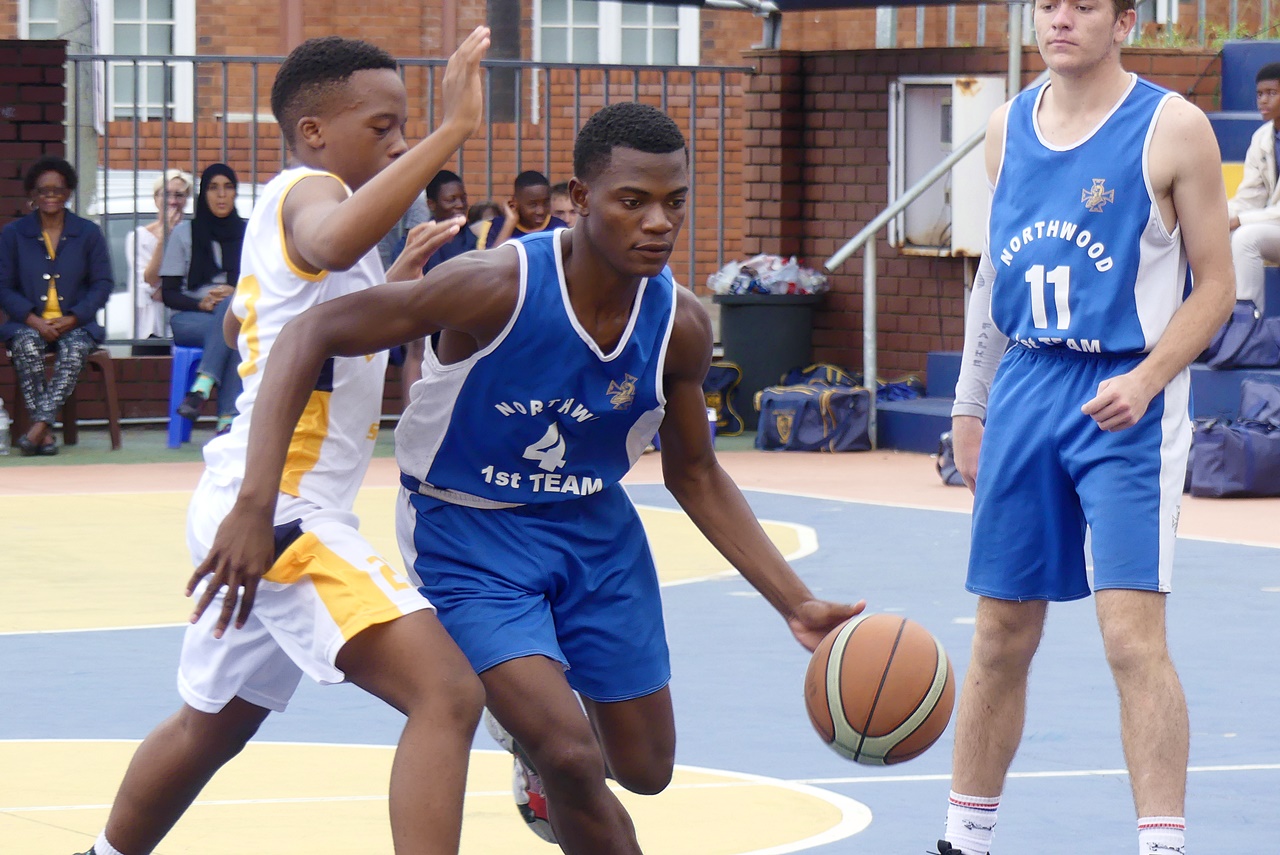
Bena Kabuya’s superb skills in close quarters made him a handful for the DHS defenders throughout the game.
DHS, though, are relentless in their defence, often double-teaming the man on the ball, which forces the opposition into poor passes and turnovers, and that approach soon began to pay dividends as they clawed their way back into the contest.
Centre Asher Knox-Davis (featured image at the top) was an immense presence around the basket, rebounding powerfully, both defensively and offensively, to help his team wrest control in the paint. Meanwhile, point guard Emmanuel Mayiza soon had the ball moving nicely around the flanks of the Northwood defence.

When the match is tight and every run counts, you can count of Clox Scoreboards of KZN. http://clox.co.za/
From a nine-point deficit, DHS quickly closed to just three down, 22-25 after the first quarter. Alongside the court, the spectators were getting pulled into the spectacle. The DHS boys and a smaller but vociferous group of Northwood boys began to make their presence known.

Northwood’s supporters didn’t take a step back from the greater numbers backing the home team, DHS.
Working their structure well, the home team hauled in and then passed Northwood to take a 35-29 lead at half-time. The momentum was with them.
During the break, a fantastic back-and-forth unfolded between the boys backing their teams from the side of the court, their numbers heaving and bobbing as they shouted out their support.

Check out the Cell C personal and business contracts at https://www.cellc.co.za/cellc/contracts
In the second half, Northwood point guard, Bena Kabuya, made his presence felt in a big way with his outstanding close skills and smooth shooting. Time after time he was able to outmanoeuvre the double-team trying to stop him, using his skills to split them or his athleticism to round them.
Led by Kabuya, the visitors came roaring back and retook the lead, three points clear at 49-46 at the three-quarter mark.

Bena Kabuya drove for a lay-up as the pressure ratcheted up towards the latter stages of the contest.
As time slipped away, Northwood doubled their advantage, moving six points ahead at 55-49. That’s when DHS captain H. Noncembu (that’s the Christian name he goes by) showed why he had been entrusted with the leadership role.
All hustle and heart, he set the example, despite struggling with cramp, and took the game to Northwood. He challenged them on the boards and drove hard towards the basket, taking the shortest and most direct route possible. When he sank a free throw, he turned to the DHS supporters and let out a roar, which brought huge cheers from the throng packing the sidelines.

Pride and passion: DHS captain H. Noncembu.
Both benches called a series of rapid timeouts as they struggled to deliver messages to their players on court over the wall of sound that had enveloped the game.
With 30 seconds remaining, DHS, spurred on by Noncembu had drawn level at 60-60. It was electric both out in the middle and along the sidelines.
Then, with time almost expired, Noncembu sank a free throw to seal a spectacular 61-60 victory for the home team. As the whistle blew, the DHS supporters bounded onto the court, jumping skywards and shouting with joy.

The DHS supporters celebrated a heart-pounding victory with unbridled joy.
Northwood’s shoulders slumped. They had played their part in a thrilling contest, but on this day, under overcast Durban skies, it was, painfully, just not enough. DHS 61-60 Northwood.

Westville dominate Durban and District Gala
DHS played host to the annual Durban and District Gala on Tuesday afternoon. The event – featuring DHS, Westville, Northwood, Glenwood, Clifton and Kearsney – consisted of the 4 x 50m relay in all strokes in the under-14, under-15, under-16, under-17 and under-19 age groups and culminated in the 5 x 50m freestyle ladder relay, writes KZN10.com’s Brad Morgan.
Contested late in the afternoon, a decently sized crowd took in some good competition in pleasant conditions, with the powerhouse Westville team, predictably, dominating proceedings. A total of 26 events were contested with the Griffins excelling and capturing the honours in 22 of the 26 relays.

While Westville ruled the roost in the Durban and Districts Gala, DHS shone in the under-15 age group, picking up wins in three of the five relays (All photos: Brad Morgan, KZN10.com)
They impressed with their depth, not only in the various strokes, but also throughout the various age groups. Westville also swept all relays in the under-14, under-16 and under-17 age groups.
The best boys’ school swimming team in South Africa
https://kzn10.com/the-best-boys-school-swimming-team-in-south-africa/
Westville swimming phenom Luca Holtzhausen dreams big
https://kzn10.com/westville-swimming-phenom-luca-holtzhausen-dreams-big/

Check out the Cell C personal and business contracts at https://www.cellc.co.za/cellc/contracts
Clifton picked up a very impressive win in the under-19 freestyle relay, which, obviously, meant their time of 1:40.84 was the fastest recorded in any relay on the day. That was the only race Westville didn’t win in the senior age group.

The competition took place in ideal late afternoon conditions, with a nice crowd in attendance.
DHS were especially strong at under-15 level. In fact, they claimed three wins to Westville’s two, with the hosts giving the crowd plenty to cheer with victories in the backstroke, butterfly and medley relays, while Westville reigned supreme in the freestyle and breaststroke races.

When the match is tight and every run counts, you can count of Clox Scoreboards of KZN. http://clox.co.za/
A hallmark of the gala, which was very pleasing to witness, was the friendly nature of the competition. It echoed days gone by when winning was not all that mattered and the appreciation of challenging oneself and others was as important as the result itself.
So, well done to all the swimmers and the coaches (and moms and dads); besides the excellence of the performances, the good-natured racing stood out.

From the first event to the last, there was no doubt that Westville would claim the silverware as champions of the Durban and Districts Gala. DHS headmaster Tony Pinheiro presented the winner’s trophy to Westville captain Ian Brijlal.
RESULTS
1st: Westville 152 points
2nd: Clifton 107 points
3rd: DHS 90 points
4th T: Glenwood 69 points
4th T: Kearsney 69 points
6th: Northwood 57 points


